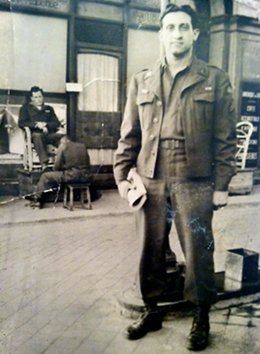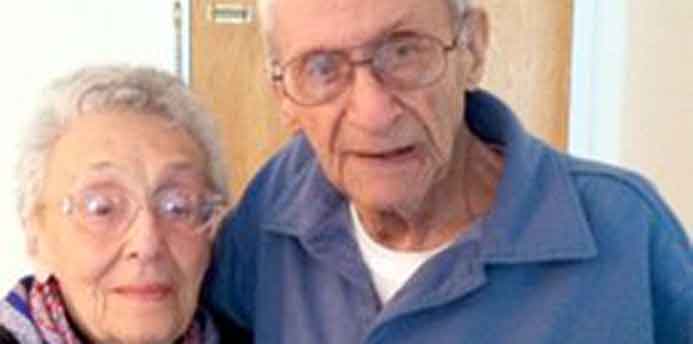In honor of Memorial Day later this month, Make It Better is interviewing local veterans every week during May. This week, we feature Morey Coleman.
At 28, Coleman was drafted in March of 1943 to serve in the U.S. Army during World War II. After training, he serviced tanks overseas in the 126th Armored Ordinance under Lieutenant General George Patton from 1945 to 1946. He was honorably discharged as a Sergeant, earning three medals.
Originally from Chicago, Coleman, 96, is retired and lives in Glenview with his wife Rosalyn, who helped tell her husband’s story. The couple will be married 71 years on June 30.
MIB: How did you end up in participating in World War II?
Morey Coleman: I was 28 when I was drafted. I was the oldest one in the outfit. A lot of the New York boys there were 19.
Rosalyn Coleman: We went to sign a new lease for our apartment that day—we lived in South Shore then. We signed it, and then we got the mail and it was his draft notice.
 MC: I went back, and I said, “I’m sorry I just signed the lease but I’m drafted,” and they said, “Don’t worry about it.” So, I didn’t worry about it, but I was worried about going.
MC: I went back, and I said, “I’m sorry I just signed the lease but I’m drafted,” and they said, “Don’t worry about it.” So, I didn’t worry about it, but I was worried about going.
MIB: Where were you stationed during the war?
MC: I started in France, and I had to take a crash course in infantry there. I went all through Germany. In Germany, I brought prisoners in, and I thought they were going to kill me because I was Jewish.
Once I took 20 prisoners on the truck—there were three of us—and they were glad to go because they got food. I took them off of a German train that we stopped and I found money lying there, which I could not use—my money was listed—but I took it, piles of it.
Then we were in Czechoslovakia, and a woman sent her son out to get me to say that I could stay with her as long as I had to. Her husband was in the slave labor camp. Well, I gave her the money.
RC: And she became a rich woman!
MIB: During the war, what were your responsibilities?
MC: I serviced the tanks. Whatever they needed, they got from me. I was in the battles but I drove in the trucks behind the tanks in case they needed anything.
RC: He also helped liberate a concentration camp.
MC: Well we were in a convoy, and a Jeep came up to me and a man says, “At the next turn, you’re going to see what you’re fighting for.” And it was Ohrdruf (near Weimar, Germany).
It was unbelievable. Open graves, bodies—they just threw them in. All the Jews were killed; the only ones living were half-Jews. And I saw where they burned them. Unbelievable. I was lucky I didn’t get shot because I was in battles, and I always said God kept me alive because he took my parents so early. I was 12-years old and I was an orphan already.
MIB: Was there ever a time during your service when you were frightened for your life?
MC: Oh sure, when I was driving the truck I had two machine guns and no windshield. I had a .50-caliber here and a .30-caliber there. There were two of us, and I took my turn at the machine gun, and he would drive, and then we’d switch.
One day we were bombarded by German planes, and you know where I was sleeping? An empty kitchen in somebody’s house. I hit my head and I was bleeding so I ran out, and they were beating us with bullets, and the medics they offered to take me, but I said, “Take him, he’s shot.” I could’ve gotten points for that.
RC: You needed a certain amount of points to get out of service.
MIB: What did you do during your free time?
MC: I was always a singer. There were a lot of singers in my family, four cantors, and so I sang for the boys from New York and they were thrilled to pieces.
Editor’s Note: On August 3, 2011, Mr. Coleman passed away. We are so thankful we were able to share his story with our readers.

